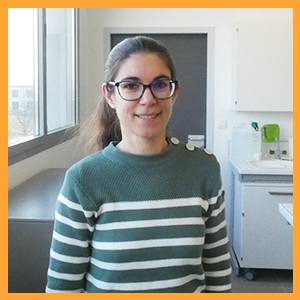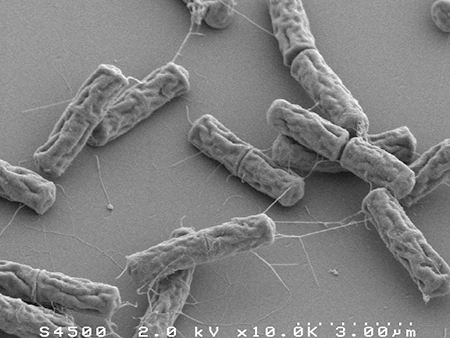[Profile] Alice Château, teacher-researcher in microbiology, part of the SporAlim team (UMR SQPOV)


What is your research about?
My research focuses on the surface of the bacterium Bacillus cereus which is an agent responsible for food poisoning and spoilage in the agri-food industry. Currently, my work aims to identify the targets of endolysins on the surface of this bacterium. Endolysins are enzymes produced by phages (bacterial viruses) capable of destroying the bacteria. This work will provide new knowledge to develop tools to detect, prevent and eliminate B. cereusThe aim of this project is to develop a new approach to food safety, particularly in biofilms.
What are your current scientific activities?
In the framework of Cécile Boutonnet's thesis, which I co-supervised with Pr Catherine Duport, we have shown that the strains of B. cereus that cause the most severe foodborne infections (emetic strains) have a layer that envelops the bacteria, called the S-layer. This layer modifies the surface properties of B. cereus and could promote the adhesion of the bacteria. This work was published in the journal Frontiers in microbiology in June 2022.
In addition, from 2024 onwards, I will be co-leading the SporAlim team of the UMR SQPOV with Véronique Broussolle (Dr INRAE). The objectives of this team are to understand the adaptation mechanisms of spore-forming bacteria throughout the food chain and to control these bacteria.
Why did you choose to work in academic research?
- By passion: since my childhood I had the curiosity to observe nature through my microscope, then I did internships in laboratories and I had the chance to meet and work with passionate scientists during my thesis at the Pasteur Institute and during my post-doctoral experiences in the USA.
- To understand: make hypotheses and set up experiments to answer them
- To transmit and share knowledge
- and because university research offers freedom to do research at a fundamental level.
What advice would you give to people who want to do research?
It is an exciting job, never routine, but it requires investment and perseverance in the face of scientific difficulties and the search for funding. Motivation and resilience are therefore essential. This quote from Winston Churchill is my leitmotiv: "Success is going from failure to failure without losing your enthusiasm". So my advice is to be persistent, motivated and determined.
What object or image from your business best illustrates you?
This is a scanning electron microscopy image of Bacillus cereus, our object of study. I am always so excited about these wonders of nature and their ingenuity in adapting to their environment. It is a fascinating object of study!

Photo by Cécile Boutonnet and Thierry Meylheuc
The laboratory: the SporAlim team, UMR SQPOV
The Sporulating Bacteria in the Food Chain (SporAlim) team is interested in spore-producing bacteria. These bacteria are very common in the environment and frequently contaminate foodstuffs, particularly plant products. They are particularly resistant to physical and chemical aggression and to thermal processing, and have a wide range of adaptations to their environment in the food chain. Among these bacteria Bacillus cereus has been identified as a reference.
The team's objective is to characterise and evaluate the risk that this bacterium represents for consumer health. We are studying solutions for controlling food contamination by B. cereus and other spore-forming species, using new technologies that allow the preservation of the quality and nutritional value of food.
>> Read more
The portraits
To discover all our portraits, go here.
Updated on 11 September 2023